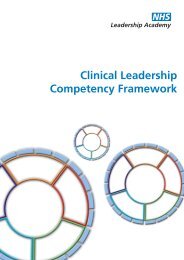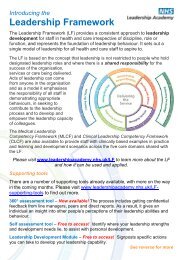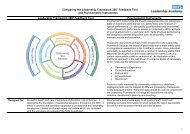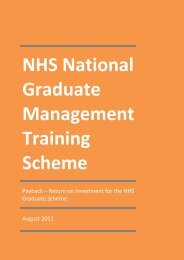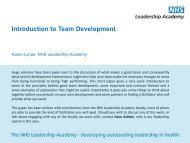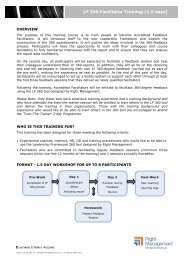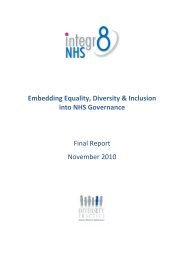Healthy NHS Board: a review of - NHS Leadership Academy
Healthy NHS Board: a review of - NHS Leadership Academy
Healthy NHS Board: a review of - NHS Leadership Academy
You also want an ePaper? Increase the reach of your titles
YUMPU automatically turns print PDFs into web optimized ePapers that Google loves.
The building blocks <strong>of</strong> governance<br />
The building blocks <strong>of</strong> governance outlined in our<br />
original <strong>review</strong> - context, intelligence, and engagement -<br />
remain important foundations <strong>of</strong> effective board<br />
governance. The principles underlying these building<br />
blocks are broadly unchanged, though guidance and<br />
research suggest a number <strong>of</strong> lessons that develop<br />
understanding <strong>of</strong> how these should be used. For<br />
example, evidence suggests that changes in external<br />
context, for example relating to the ways in which<br />
the English <strong>NHS</strong> is re-organised, represent significant<br />
challenges to boards, but those that foster a supportive<br />
and open culture may harness these changes to<br />
encourage innovation. Intelligence remains important.<br />
It should be effective and accessible, drawing together<br />
qualitative and quantitative data: to support effective<br />
flow <strong>of</strong> information, designation <strong>of</strong> a board-level Chief<br />
Information Officer is recommended. Engagement <strong>of</strong><br />
stakeholders - patients and the public, staff and partner<br />
organisations - has increased in prominence since our<br />
original <strong>review</strong>. Approaches to and potential benefits <strong>of</strong><br />
engagement - for example in terms <strong>of</strong> ensuring public<br />
relevance <strong>of</strong> organisational objectives and staff wellbeing<br />
- are described.<br />
Individual board roles<br />
The roles <strong>of</strong> <strong>NHS</strong> provider board members have, overall,<br />
changed little since our original <strong>review</strong> was written.<br />
However, the available guidance and research evidence<br />
have grown. Therefore, we focus only on where roles<br />
have altered in guidance and how research might<br />
guide our understanding <strong>of</strong> individual board member<br />
contributions. One theme that emerges strongly is how<br />
particular board members might develop their skills and<br />
activities to support greater effectiveness <strong>of</strong> the board as<br />
a whole. Another is that both Chair and CEO have roles<br />
to ensure that executive directors contribute fully to the<br />
culture <strong>of</strong> a unitary board.<br />
<strong>Board</strong> committees<br />
The purpose and function <strong>of</strong> board committees<br />
remains broadly unchanged since our original <strong>review</strong>.<br />
We describe where the functions <strong>of</strong> committees have<br />
developed; we also present evidence on the extent to<br />
which boards in the English <strong>NHS</strong> now have a Quality<br />
Committee.<br />
Building board effectiveness<br />
Many <strong>of</strong> the features <strong>of</strong> boards remain broadly<br />
unchanged since our original <strong>review</strong>. Research has<br />
provided some useful lessons on how these might<br />
contribute to high quality board governance.<br />
Research indicates that board composition, in terms<br />
<strong>of</strong> clinical background and proportion <strong>of</strong> women,<br />
might positively influence board effectiveness. In terms<br />
<strong>of</strong> process, it is recommended that effective boards<br />
prioritise quality and safety and ensure monitoring does<br />
not supplant strategy, but survey and observational<br />
research indicate that boards as yet prioritise neither<br />
sufficiently. <strong>Board</strong> culture is still regarded as a pivotal<br />
issue. However, the factors influencing this are as yet<br />
not well understood, and it is possible that structure and<br />
composition may exert an influence on culture.<br />
‘People strategy’ is now identified as an additional<br />
feature <strong>of</strong> board effectiveness, reflecting how boards<br />
need to support the development <strong>of</strong> future leaders and<br />
engage with staff to ensure a healthy workforce overall.<br />
The relationship between board characteristics and<br />
leadership effectiveness is complex, and heavily<br />
influenced by context: a ‘one size fits all’ mind-set is<br />
unlikely to be useful. Also, what boards do - as reflected<br />
in processes and dynamics - is likely to be at least as<br />
important as their more structural features. However,<br />
more research is needed in order to gain a clear<br />
understanding <strong>of</strong> these complex relationships.<br />
We note that in the context <strong>of</strong> <strong>NHS</strong> Foundation Trusts,<br />
the role and potential contribution <strong>of</strong> governors to board<br />
governance has grown significantly. We also note that,<br />
so far, progress in making the most <strong>of</strong> their potential<br />
contribution has been limited, and outline potential<br />
benefits <strong>of</strong> boards empowering their governors through<br />
greater engagement and training.<br />
www.leadershipacademy.nhs.uk 5



